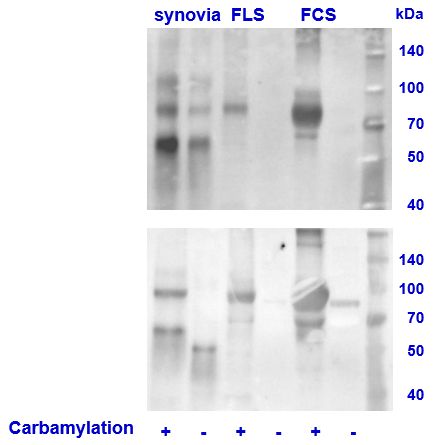Session Information
Session Type: Abstract Submissions (ACR)
Background/Purpose
Antibodies against carbamylated proteins (CarP) are a new type of autoantibodies specific of patients with rheumatoid arthritis (RA) relative to healthy controls, but their specificity in relation with other rheumatic diseases has not been established. In addition, they have been analysed with CarP from Fetal Calf Serum (FCS) raising doubts about their protein specificity.
Methods
Anti-CarP FCS from 520 patients with RA was compared with reactivity in 208 healthy donors and 90 patients with each of the following diseases: osteoarthritis (OA), psoriatic arthritis (PsA) and ankylosing spondylitis (AS). In addition, anti-CarP-FCS from 97 patients with RA was correlated with reactivity against CarP from seven human tissues.
Results
Anti-CarP-FCS antibodies were found in 35.9 % of the patients with RA. These antibodies were also observed in 4.8 % of the healthy controls, 4 % of the OA patients, 6 % of the PsA patients and 24.4 % of the AS patients. Therefore, their specificity was high in relation with healthy controls and in relation with OA and PsA patients, but not in relation with patients with AS. These results reinforce the nature of anti-CarP as an independent autoantibody system that will be worth to study in AS patients.
Protein extracts from FCS and the 7 analysed tissues were carbamylated with similar efficiency allowing for meaningful comparisons of the serum reactivities against them. There were at least some sera showing reactivity against each of the tissues analysed, but the frequencies and titers showed clear differences in function of the tissue used as source of CarP (Table 1).
|
Titer correlation |
Concordance |
|
|||||||
|
Tissue |
Positive, % |
% of the FCS+ |
ρ Spearman |
P-value |
Gamma |
P-value |
|||
|
FCS |
57.7 |
– |
Ref. |
Ref. |
Ref. |
Ref. |
|||
|
FLS |
49.5 |
91.7 |
0.76 |
<10-15 |
0.94 |
<10-15 |
|||
|
synovia |
40.2 |
89.7 |
0.48 |
<10-7 |
0.88 |
<10-14 |
|||
|
Liver |
52.6 |
70.6 |
0.64 |
<10-10 |
0.72 |
<10-7 |
|||
|
Tyroid |
29.9 |
82.8 |
0.31 |
<10-3 |
0.69 |
<10-4 |
|||
|
Kidney |
45.4 |
77.3 |
0.46 |
<10-4 |
0.65 |
<10-5 |
|||
|
Spleen |
16.5 |
68.8 |
0.19 |
n.s |
0.38 |
n.s |
|||
|
Lung |
26.8 |
61.5 |
-0.08 |
n.s |
0.09 |
n.s |
|||
In addition, the reactivities that best correlated with anti-CarP-FCS were against CarP from FLS and synovia. However, Western blot analysis showed a different pattern of binding of RA patient sera when the CarP were from synovia or from FCS in Western blots (Figure 1).
These results indicate the protein specificity of the anti-CarP antibodies present in RA sera.
Conclusion
The anti-CarP-FCS antibodies are moderately prevalent in patients with RA and highly specific of them in comparison with healthy controls, or patients with OA or PsA, but not with AS. Furthermore, analysis of reactivity against CarP from different tissues shows that the anti-CarP reactivity is dependent of specific CarP, which are different depending on the tissue. Fortunately, results with FCS, which has been used as source of CarP for testing RA sera, strongly correlate with synovia. This correlation contributes to confidence in the previously reported clinical and genetic associations of this new type of autoantibodies.
Disclosure:
A. Gonzalez,
None;
A. Montes,
None;
E. Perez-Pampin,
None;
M. D. Boveda,
None;
J. J. Gomez-Reino,
None.
« Back to 2014 ACR/ARHP Annual Meeting
ACR Meeting Abstracts - https://acrabstracts.org/abstract/clinical-and-tissue-specificity-of-antibodies-against-carbamylated-proteins-in-patients-with-rheumatoid-arthritis/

